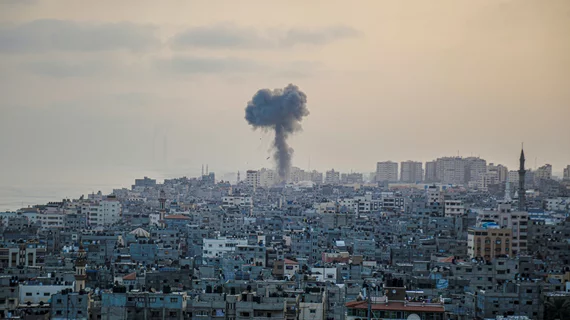Hospitals thrust into wartime healthcare: Scenes from two fronts
Last Saturday’s massacre of civilians in Israel and that nation’s initial military response, a heavy bombardment of densely populated Gaza this week, have stressed hospitals on both sides of the border—in some cases to the breaking point.
What has life been like at those hospitals? First-person accounts from frontline coverage paint a chilling but unignorable picture.
- Yan Gorjaltsan, a 27-year-old Israeli paramedic, described the hospital to which he transported patients (Soroka Medical Center in Be’er Sheva) as a scene out of a World War II movie—nurses and doctors frantically taking care of patients while others scream for help. “You can actually smell the blood in the air. People are lying on the floor,” he said, adding that the trauma room in the hospital had to be closed to new patients because it was already so full. “Doctors decided not to take care of patients who were in critical situations because their chance of getting out of there [alive] was so small.” (Source: Insider)
- Dr. Medhat Abbas, director general of the Gaza Ministry of Health: “Our capacity is 2,000 beds. For that reason, 2,000 beds with more than 2,000 injured—it means that we are about to collapse. The other thing is that, with [a] shortage of medication, we are consuming in one day what in ordinary days we would consume in one month. We have no electricity in hospitals, so we are relying on standby generators, which are consuming a lot of our fuel.” (Source: Al Jazeera)
- Israeli hospital volunteer Avishag Avinoam: “The two hospitals in southern Israel, Barzilai in Ashkelon and Soroka in Be’er Sheva, have received more than 2,000 wounded since the start of the attack. Since the hospital authorities could not handle the sheer number of people being brought in, hundreds were shifted to central hospitals in Jerusalem or Tel Aviv.” (Source: NDTV World/New Delhi Television)
- Léo Cans, head of Jerusalem-based mission for Palestine at Médecins Sans Frontières (Doctors Without Borders): “The situation in Gaza is catastrophic; the hospitals are overwhelmed. The number of wounded is extremely high—there is a constant influx into all the hospitals in the Gaza Strip. The medical teams are exhausted, working around the clock to treat the wounded. … We are very concerned to see that medical facilities have not been spared. One of the hospitals we support was hit by an airstrike and damaged. Another airstrike destroyed an ambulance carrying the wounded, right in front of the hospital where we work.” (Source: Médecins Sans Frontières)
- Reporter Thomas Brewster: “Israel’s Soroka Medical Center, located just east of Gaza in Be’er Sheva, is now using facial recognition to help family members locate their missing loved ones. The software is able to take an image of a person, including individuals whose features have been impacted by physical trauma, and find a match amongst photos sent in by concerned family members, according to Ofer Ronen, the executive vice president of global development at Corsight AI, which is providing the technology to the hospital for free.” (Source: Forbes)
- Mahmoud Shalabi, Gaza director at Medical Aid for Palestinians: “The neonatal unit at Al Shifa hospital, the central trauma hospital and the largest in Gaza, was partly damaged due to bombardments around the facility. The roads around Al Shifa have been severely impacted, which is limiting movement to it, while all hospitals are suffering greatly from the lack of supplies and personnel. Yesterday, the ministry of health called for all nurses in Gaza to begin volunteer work in the nearest hospital.” (Source: The Guardian)
And a few especially illustrative headlines:
- “Controversy as Hamas terrorists are treated in Israeli hospitals” (i24 News)
- “Gaza hospitals running out of supplies to treat wounded” (The Independent)
- “Israel’s colossal underground hospital braces for Hezbollah blitz” (Newsweek)
- “Palestinians shelter in schools, hospitals” (Wall Street Journal)
- “Rocket from Gaza hits hospital in Ashkelon in southern Israel” (Alarabiya News)

